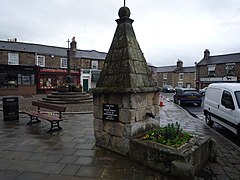Corbridge
| Corbridge | |
|---|---|
 Market Place, Corbridge town centre |
|
| Corbridge shown within Northumberland | |
| Population | 3,672 (2011) |
| OS grid reference | NY990646 |
| Shire county | |
| Region | |
| Country | England |
| Sovereign state | United Kingdom |
| Post town | CORBRIDGE |
| Postcode district | NE45 |
| Dialling code | 01434 |
| Police | Northumbria |
| Fire | Northumberland |
| Ambulance | North East |
| EU Parliament | North East England |
| UK Parliament | |
Corbridge is a village in Northumberland, England, 16 miles (26 km) west of Newcastle and 4 miles (6 km) east of Hexham. Villages nearby include Halton, Acomb, Aydon and Sandhoe.
Known to the Romans as something like Corstopitum or Coriosopitum, wooden writing tablets found at Vindolanda suggest it was probably locally called Coria (meaning a tribal centre). According to Bethany Fox, the early attestations of the English name Corbridge 'show variation between Cor- and Col-, as in the earliest two forms, Corebricg and Colebruge, and there has been extensive debate about what its etymology may be. Some relationship with the Roman name Corstopitum seems clear, however'.
Coria was the most northerly town in the Roman Empire, lying at the junction of Stanegate and Dere Street.
The first fort was established c. AD 85, although there was a slightly earlier base nearby at Beaufront Red House. By the middle of the 2nd century AD, the fort was replaced by a town with two walled military compounds, which were garrisoned until the end of the Roman occupation of the site. The best-known finds from the site include the stone Corbridge Lion and the Corbridge Hoard of armour and sundry other items. In Rudyard Kipling's Puck of Pook's Hill, the town of Hunno on the Wall, is probably based on Corstopitum.
The Roman Town is now managed by English Heritage on behalf of HM Government. The site has been largely excavated and features a large museum and shop. The fort is the top-rated attraction in Corbridge and is open daily between 10 and 6 in the summer and at weekends between 10 and 4 in the winter.
The Church of England parish church of Saint Andrew is thought to have been consecrated in 676. Saint Wilfrid is supposed to have had the church built at the same time as Hexham Abbey. It has been altered several times since, with a Norman doorway, and a lychgate built as a First World War memorial. The Church is built largely from stone taken from Hadrian's Wall, and the entrance to the Church is through glass doors given by Rowan Atkinson (Blackadder and Mr. Bean) and etched in memory of his mother. (Information obtained during a recent visit to the town and the Church.)
...
Wikipedia

